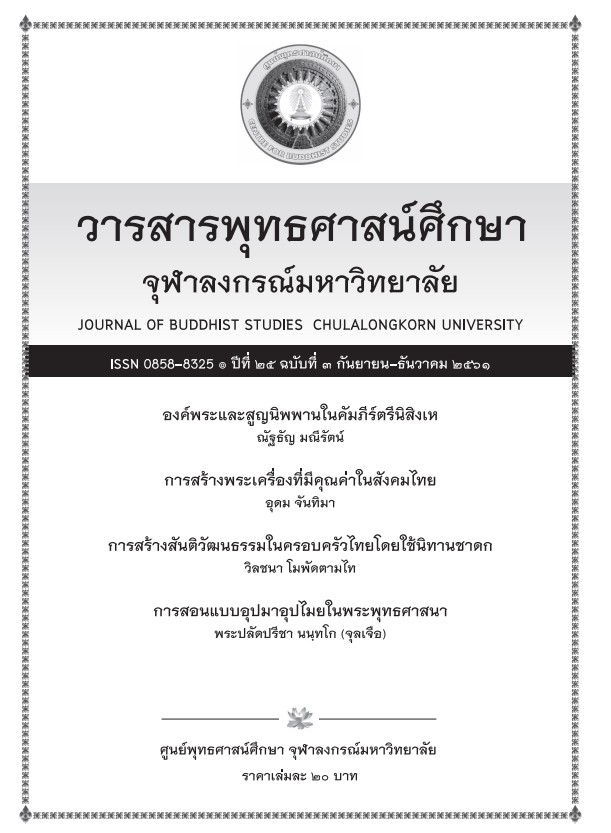การสร้างสันติวัฒนธรรมในครอบครัวไทย โดยใช้นิทานชาดก
คำสำคัญ:
นิทานชาดก, สันติวัฒนธรรม, ครอบครัวไทยบทคัดย่อ
การวิจัยครั้งนี้มีจุดมุ่งหมายเพื่อ ๑) ศึกษาเนื้อหาเรื่องเล่านิทานชาดก ๒) ศึกษาผลของการใช้นิทานชาดกในการสร้างสันติวัฒนธรรมในครอบครัวไทย ๓) ศึกษาปัญหาในการสร้างสันติวัฒนธรรม ผ่านการเล่านิทานชาดกการวิจัยนี้เป็นการวิจัยเชิงปฏิบัติการ กลุ่มตัวอย่างในการศึกษาครั้งนี้มีจำนวน ๒๐ ครอบครัว โดยเป็นการเลือกแบบเจาะจง ส่วนนิทานชาดกที่ใช้นั้นได้คัดเลือกเรื่องเล่าชาดกที่เข้าข่ายเป็นนิทานสร้างสันติวัฒนธรรมจากชาดกในพระไตรปิฎก ๕๔๗ ชาดก โดยเน้นโครงสร้างเนื้อหา แก่นของเรื่องสร้างสันติวัฒนธรรม ด้านความมีน้ำใจแบ่งปันผู้อื่นแบบจิตอาสาไม่หวังผลตอบแทน ด้านความอดทนต่อความยั่วยุให้โกรธ โมโห ด้านการรู้ระงับความโกรธและโมโหของตนเอง ด้านการให้อภัยต่อคนและสัตว์ที่ทำให้เราเดือดร้อนทั้งต่ออารมณ์ความรู้สึกของการกระทำที่ทำให้เจ็บปวดด้านการให้เกียรติเคารพต่อกัน เครื่องมือใช้ในการวิจัยได้แก่ นิทานชาดก แบบสัมภาษณ์ และแบบสังเกต การวิเคราะห์ข้อมูลใช้การวิเคราะห์เชิงพรรณนาผลการวิจัย พบว่า ๑) เรื่องเล่าชาดก ๕๔๗ เรื่อง มีเนื้อหาเข้าข่ายการเสริมสร้างสันติวัฒนธรรม จำนวน ๒๐ เรื่อง๒) ผลของการใช้นิทานชาดกส่งผลให้ครอบครัวมีการเปลี่ยนแปลงความสัมพันธ์ภายในครอบครัวมากขึ้น กล่าวคือ ทำให้สมาชิกในครอบครัว เมื่อเกิดความขัดแย้งกัน ก็รู้จักการให้อภัยกันมากขึ้น มีความเคารพซึ่งกันและกันมากขึ้น ระหว่างคนต่างรุ่นและรุ่นเดียวกัน อีกทั้งทำให้สมาชิกในครอบครัวไม่แสดงอาการโกรธโมโหและลดความรุนแรง เมื่อเกิดข้อขัดแย้งหรือเกิดปัญหาภายในครอบครัว ทำให้ครอบครัวมีความรักความห่วงใยกันมากขึ้น ก่อให้เกิดการสร้างสันติวัฒนธรรมในครอบครัว ๓) ปัญหาที่พบในการสร้างสันติวัฒนธรรม ผ่านนิทานชาดก คือประการแรก ในบางครอบครัวยังมีสมาชิกในครอบครัวที่อ่านหนังสือไม่ออก ประการที่สอง กลุ่มตัวอย่างบางส่วนไม่สนใจอย่างจริงจังในการเล่านิทานให้ครอบครัวฟัง ประการที่สาม ครอบครัวส่วนใหญ่ไม่เคยเล่านิทานให้ลูก หลานฟัง ประการที่สี่ ผู้เล่านิทานยังไม่สามารถเล่านิทานให้น่าสนใจได้
Downloads
เอกสารอ้างอิง
พร้อมพิไล บัวสุวรรณ์ ๒๕๕๔ : ๖๑, ครอบครัวและโรงเรียน หุ้นส่วนเพื่อคุณภาพของผู้เรียน, สำนักพิมพ์แสงดาว, พิมพ์ครั้งที่ ๑
อังคณา ช่วยค้ำชู, ความรุนแรงในครอบครัว : สาเหตุ ผลกระทบและแนวทางการช่วยเหลือ,วารสารธรรมศาสตร์ ปีที่ ๓๑ ฉบับที่ ๓ พ.ศ.๒๕๕๕.
สถาบันบันลือธรรม ๒๕๕๔, พระเจ้า ๕๐๐ ชาติ: รวมชาดกจากพระไตรปิฎก ๔๕ เล่ม ครบสมบูรณ์ ๕๔๗พระชาติ, สำนักพิมพ์ธรรมสภา
มารค ตามไท, ๒๕๖๐, “การวิเคราะห์การเปลี่ยนแปลงที่เกิดขึ้นกับตัวบุคคลในกระบวนการวิจัยเชิงปฎิบัติการ”, เอกสารประกอบหลักสูตรปริญญาเอกสาขาการสร้างสันติภาพ, สถาบันศาสนา วัฒนธรรม และสันติภาพ, มหาวิทยาลัยพายัพ.
อัชรา เอิบสุขสิริ, ๒๕๕๖, จิตวิทยาสำหรับครู, สำนักพิมพ์จุฬาลงกรณ์มหาวิทยาลัย, พิมพ์ครั้งที่ ๑
ดาวน์โหลด
เผยแพร่แล้ว
รูปแบบการอ้างอิง
ฉบับ
ประเภทบทความ
สัญญาอนุญาต
บทความที่ได้รับการตีพิมพ์เป็นลิขสิทธิ์ของศูนย์พุทธศาสน์ จุฬาลงกรณ์มหาวิทยาลัย
ข้อความที่ปรากฏในบทความแต่ละเรื่องในวารสารวิชาการเล่มนี้เป็นความคิดเห็นส่วนตัวของผู้เขียนแต่ละท่านไม่เกี่ยวข้องกับศูนย์พุทธศาสน์ จุฬาลงกรณ์มหาวิทยาลัย และคณาจารย์ท่านอื่นๆในมหาวิทยาลัยฯ แต่อย่างใด ความรับผิดชอบองค์ประกอบทั้งหมดของบทความแต่ละเรื่องเป็นของผู้เขียนแต่ละท่าน หากมีความผิดพลาดใดๆ ผู้เขียนแต่ละท่านจะรับผิดชอบบทความของตนเองแต่ผู้เดียว






